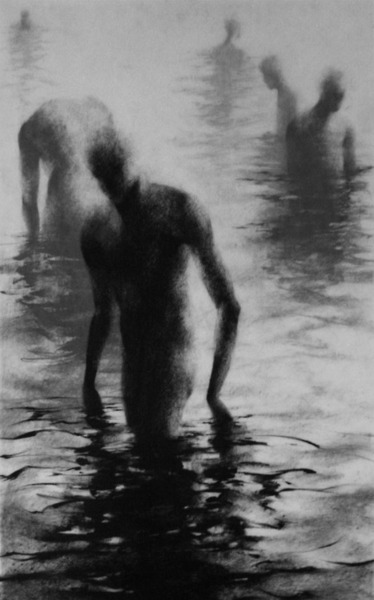(7 Day Intensive at Centre of Gravity, 180 Sudbury Street, Toronto, Spring, 2011. Talks by Michael Stone, notes by MH (with errancies, mishearings, conjectures.) This is talk 8 of 8 on Dogen’s text Time is Passing), written in 13th century Japan.)
For the Time Being by Norman Fischer
August 7, 2011 New York Times
I recently returned from a week-long Zen meditation retreat on the Puget Sound. I am a Zen Buddhist priest, so a meditation retreat isn’t exotic to me: it’s what I do. But this one was particularly delightful. Sixty-five of us in silence together for a week, as great blue herons winged slowly overhead, swallows darted low to the ground before us as we walked quietly on the open grassy space between the meditation hall and the dining room. Rabbits nibbled on tall grasses in the thicket by the lake. The sky that far north is glorious this time of year, full of big bright clouds that can be spectacular at sunset — which doesn’t happen until around 10 p.m., the sky ablaze over the tops of the many islands thereabouts.

So yes, it was peaceful, it was quiet, it was beautiful, and nice to be away from all telephones and computers, all tasks and ordinary demands, all talking, all purposeful activity. The retreat participants are busy people like everyone else, and they appreciated the silence, the natural surroundings, and the chance to do nothing but experience their lives in the simplest possible way.
It is thoroughly normal to be so tentative about the time of our lives, or so asleep within it, that we miss it entirely.”
As most people know, a Zen meditation retreat is not a vacation. Despite the silence and the beauty, despite the respite from the busyness, the experience can be grueling. The meditation practice is intense and relentless, the feeling in the hall rigorous and disciplined. We start pretty early in the morning and meditate all day long, into the late evening. It can be uncomfortable physically and emotionally. And some people find it hard not to talk at all for a week. So, what’s in it for them?
If you live long enough you will discover the great secret we all hate to admit: life is inherently tough. Difficult things happen. You lose your job or your money or your spouse. You get old, you get sick, you die You slog through your days beleaguered and reactive even when there are no noticeable disasters — a normal day has its many large and small annoyances, and the world, if you care to notice, and it is difficult not to, is burning.
Life is a challenge and in the welter of it all it is easy to forget who you are. Decades go by. Finally something happens. Or maybe nothing does. But one day you notice that you are suddenly lost, miles away from home, with no sense of direction. And you don’t know what to do.
The people at the retreat were not in crisis — at least no more than anyone else. I know most of them pretty well. They are people who have made the practice of Zen meditation a regular part of their daily routine, and come here not to forget about their troubles and pressures, but for the opposite reason: to meet them head on, to digest and clarify them. Why would they want to do this? Because it turns out that facing pain — not denial, not running in the opposite direction — is a practical necessity.
During the week of the retreat I generally give a daily talk. This week I talked about time, using as my text the 13th century Zen Master Dogen’s famous essay “The Time Being,” a treatise on the religious dimension of time.
Dogen’s view is uncannily close to Heidegger’s: being is always and only being in time; time is nothing other than being. This turns out to be less a philosophical than an experiential fact: to really live is to accept that you live “for the time being,” and to fully enter that moment of time. Living is that, not building up an identity or a set of accomplishments or relationships, though of course we do that too. But primarily, fundamentally, to live is to embrace each moment as if it were the first, last, and all moments of time. Whether you like this moment or not is not the point: in fact liking it or not liking it, being willing or unwilling to accept it, depending on whether or not you like it, is to sit on the fence of your life, waiting to decide whether or not to live, and so never actually living. I find it impressive how thoroughly normal it is be so tentative about the time of our lives, or so asleep within it, that we miss it entirely. Most of us don’t know what it actually feels like to be alive. We know about our problems, our desires, our goals and accomplishments, but we don’t know much about our lives. It generally takes a huge event, the equivalent or a birth or a death, to wake up our sense of living this moment we are given – this moment that is just for the time being, because it passes even as it arrives. Meditation is feeling the feeling of being alive for the time being. Life is more poignant than we know.
Dogen writes, “For the time being the highest peak, for the time being the deepest ocean; for the time being a crazy mind, for the time being a Buddha body; for the time being a Zen Master, for the time being an ordinary person; for the time being earth and sky… Since there is nothing but this moment, ‘for the time being’ is all the time there is.”
For seven days that week I spoke about this in as many ways as I could think of, silly and sometimes not silly, and for seven days 65 silent people listened and took Dogen’s words to heart.
We want enjoyment, we want to avoid pain and discomfort. But it is impossible that things will always work out, impossible to avoid pain and discomfort. So to be happy, with a happiness that doesn’t blow away with every wind, we need to be able to make use of what happens to us — all of it — whether we find ourselves at the top of a mountain or at the bottom of the sea.
Norman Fischer is a senior Zen Buddhist priest and poet. He is the author, most recently, of “Sailing Home: Using the Wisdom of Homer’s Odyssey to Navigate Life’s Perils and Pitfalls,” and the new poetry collection “Questions/Places/Voices/Seasons.”


